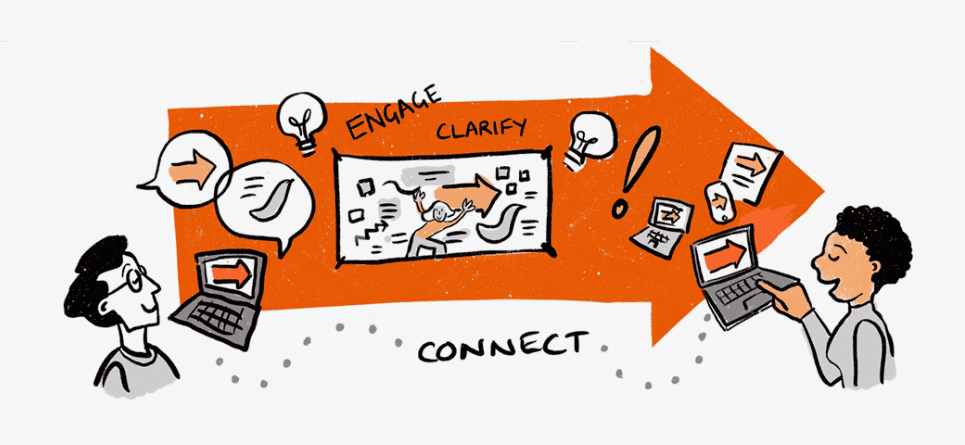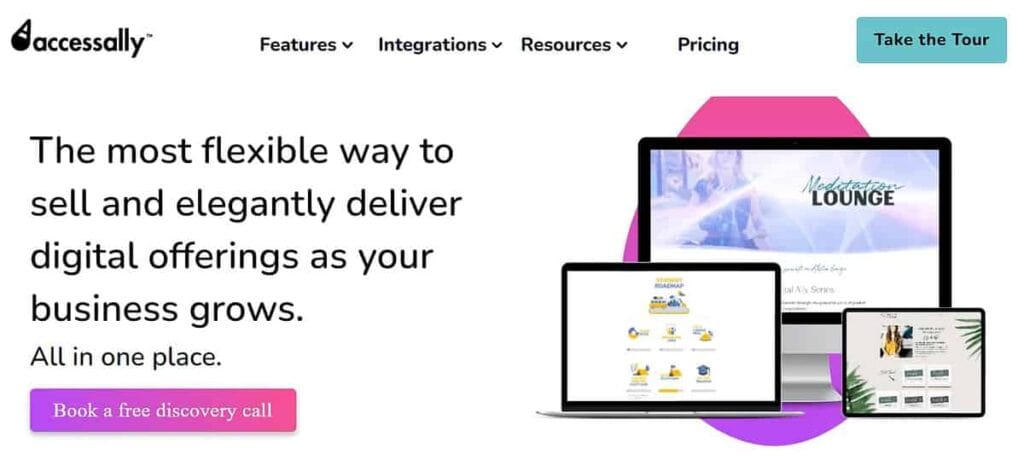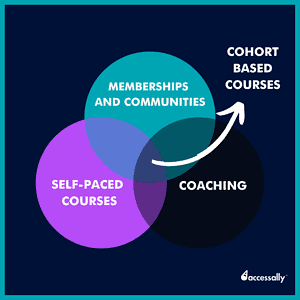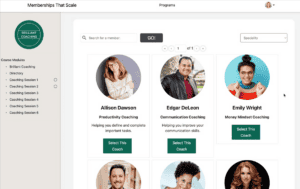Are you on a quest to connect, engage, and inspire your clients more effectively? If so, online group coaching could be the perfect solution.
The digital world provides a unique opportunity to deliver world-class coaching to a group, all while growing your business and reaching clients no matter where they are.
This comprehensive guide to online group coaching is here to help you navigate the transformation of your coaching business.
We’ll explore the best platforms, techniques, and strategies to make your group coaching sessions not only effective but also enjoyable.
From understanding the concept of online group coaching to selecting the right platform and creating successful coaching programs, this guide has got you covered.
Whether you’re a seasoned coach looking to expand your services or a novice exploring the coaching industry, this guide will provide you with the insights you need to make your online group coaching program a resounding success.
Let’s dive in and discover how you can enrich your coaching practice with the power of online group coaching!
Understanding the power of online group coaching
In the realm of personal and professional development, online group coaching stands out as a powerful tool.
Unlike one-on-one coaching, group coaching brings together individuals who share similar goals or challenges, creating a dynamic environment for learning and growth.
This collaborative approach to coaching has gained significant momentum in recent years, especially in the wake of the COVID-19 pandemic.
Statistics reveal a compelling shift in the coaching landscape: face-to-face coaching decreased by almost 75% following the onset of the pandemic, while online coaching surged by 57%. This trend underscores the growing relevance and acceptance of online group coaching.
The appeal of online group coaching is multi-faceted. Group coaching:
- Offers scalability, allowing coaches to reach and impact more lives simultaneously.
- Provides accessibility, breaking down geographical barriers, and making coaching services available to anyone with an internet connection.
- Fosters community building, as participants can share experiences, insights, and encouragement, creating a support network that extends beyond the coaching sessions themselves.
However, online group coaching is not without its challenges.
Coaches may grapple with setting up a successful online group coaching program, managing group dynamics, and keeping participants engaged in a virtual setting.
Fortunately, these challenges are not insurmountable.
The right strategies and tools can enable coaches to harness the power of online group coaching, offering a scalable business model, a platform for peer learning and support, and a rich tapestry of diverse perspectives and experiences.
Benefits of online group coaching
Online group coaching offers a plethora of benefits, not just for coaches, but also for participants and businesses.
For coaches, the benefits are manifold. Online group coaching can:
- Increase income potential by serving multiple clients at once.
- Expand a coach’s reach, making their services accessible to individuals across the globe.
- Amplify a coach’s impact, as the collective learning in a group can lead to transformative changes in participants’ lives.
Participants, too, stand to gain immensely from online group coaching.
- The collective wisdom of a group can enhance peer learning, as participants can learn from each other’s experiences and insights.
- The diversity of perspectives in a group can enrich discussions and problem-solving, leading to more creative and effective solutions.
- The affordability of group coaching, compared to one-on-one coaching, can make professional coaching services accessible to a wider audience.
Businesses can also reap significant benefits from online group coaching. It can:
- Serve as a potent tool for team building, fostering collaboration and cohesion among team members.
- Aid in leadership development, as group coaching can help individuals develop essential leadership skills such as active listening, empathy, and decision-making.
- Boost productivity, as the personal and professional growth of employees can translate into improved performance and outcomes.
Choosing the right coaching model
To design a successful online group coaching program, it’s crucial to choose the right coaching model.
The model you choose will shape the structure of your program, the dynamics within your group, and the outcomes for your participants.
Let’s explore some popular models of group coaching.
Mastermind groups
These are peer-to-peer mentoring groups where individuals learn from each other’s experiences and insights.
A coach facilitates the discussions, but the focus is on collective problem-solving and mutual support.
This model is ideal for coaches who value collaboration and peer learning, and for participants who are keen to learn from diverse perspectives.
Peer coaching groups
In these groups, participants take turns coaching each other under the guidance of a professional coach.
This model can be particularly beneficial for individuals looking to develop their coaching skills, and for coaches who believe in the power of experiential learning.
Topic-specific groups
These groups focus on a specific topic or challenge, such as leadership development or work-life balance. The coach provides expert guidance and facilitates discussions around the chosen topic.
This model is best suited for coaches with specialized expertise and for participants seeking targeted solutions.
When it comes to delivering any of these coaching models, there are several options to consider:
Standard programs
These are predefined programs with a set schedule but no specific start date. Participants can join at any time and progress at their own pace.
This model offers flexibility but may lack the sense of community that comes with synchronous learning.
Cohort-based learning
In this model, all participants start the program at the same time and progress at the same pace. This fosters a strong sense of community and allows for shared learning experiences.
However, it may not be suitable for individuals who prefer to learn at their own pace.
Memberships
This model allows coaching clients to start the same training at any time.
It offers flexibility and continuous access to coaching resources. However, it may lack the structure and progression of a predefined program.
Each of these models and delivery methods has its pros and cons, and what works best will depend on the coach’s style and expertise, the participants’ needs and preferences, and the desired outcomes of the coaching program.
Some factors to consider when choosing a coaching model include:
- Your expertise and style as a coach: Do you have specialized knowledge that you can share in a topic-specific group? Do you thrive in facilitating peer-to-peer learning, or do you prefer a more directive approach?
- The needs and preferences of your participants: Are they looking for a structured program with a clear progression, or do they value flexibility and autonomy in their learning? Do they want to learn from their peers, or are they seeking expert guidance?
- The desired outcomes of the coaching program: Are you aiming to develop specific skills or address specific challenges? Or is your goal to foster a supportive community where participants can learn from each other’s experiences and insights?
By carefully considering these factors, you can choose a coaching model that aligns with your strengths as a coach, meets the needs of your participants, and delivers the desired outcomes.
Structuring a successful online group coaching program
The success of an online group coaching program hinges largely on its structure.
A well-structured program provides a clear roadmap for participants, facilitates effective learning, and ensures that the coaching goals are met.
Here are some tips on how to structure an online group coaching program:
Define clear goals and objectives
Start by defining what you want your participants to achieve by the end of the program.
These goals should be Specific, Measurable, Achievable, Relevant, and Time-bound (SMART). Clear goals will guide the design of your program and serve as a benchmark for assessing its success.
Create a program timeline
A timeline provides a clear structure for your program, outlining when each session will take place and what topics will be covered.
This helps participants know what to expect and allows them to plan their time effectively.
Design curriculum and session plans
Your curriculum should be designed to achieve the program’s goals.
Each session should have a clear purpose, and the activities should be interactive and engaging to facilitate learning.
Session plans should include a mix of teaching, discussion, group work, and reflection.
Set up communication and feedback mechanisms
Regular communication keeps participants engaged and informed.
Feedback mechanisms allow you to gauge participants’ understanding and adjust your approach as needed.
These could include regular check-ins, surveys, or interactive activities that provide immediate feedback.
Technology plays a pivotal role in structuring a successful online group coaching program.
Video conferencing platforms enable live sessions or webinars, collaboration tools facilitate group work, and learning management systems allow for online course content delivery and progress tracking.
Platforms like AccessAlly can greatly simplify the process of structuring your online group coaching program.
With its comprehensive platform, you can manage all aspects of your program in one place.
Its flexible course builder enables you to design your curriculum and session plans with ease, while its personalized automation allows you to set up communication and feedback mechanisms that keep participants engaged and informed
Engaging group activities and exercises for success
Engaging activities and exercises are the lifeblood of successful online group coaching. They foster active participation, build rapport among participants, and facilitate learning and growth.
- Icebreakers: These activities help participants get to know each other and create a positive group atmosphere. They can be as simple as sharing fun facts or as creative as virtual games.
- Brainstorming sessions: These sessions encourage participants to share their ideas freely, promoting creativity and problem-solving. They can be used to address specific challenges or explore potential opportunities.
- Role-plays: These exercises allow participants to practice new skills or behaviors in a safe environment. They can be particularly useful in leadership or communication coaching.
- Case studies: These involve analyzing real or hypothetical situations related to the coaching topic. They can provide valuable insights and stimulate thoughtful discussions.
- Reflection exercises: These encourage participants to reflect on their learning and experiences. They can deepen understanding and promote personal growth.
Keeping learners engaged outside of coaching sessions is also crucial. This can be achieved by setting homework, giving feedback on assignments, and encouraging participants to apply what they’ve learned in their daily lives.
When choosing and implementing activities, it’s important to consider the program’s goals and objectives, the participant’s needs and preferences, and the chosen coaching model.
The activities should align with these factors and be varied to maintain interest and cater to different learning styles.
Mastering group coaching techniques
Mastering certain skills and techniques can significantly enhance the effectiveness of online group coaching. Here are some key ones to focus on:
- Building rapport: This involves creating a positive and trusting relationship with and among participants. It can be achieved through active listening, empathy, and genuine interest in participants’ experiences and perspectives.
- Creating a safe and supportive environment: With this, you can encourage participants to share openly and honestly. It requires setting clear expectations, respecting confidentiality, and fostering mutual respect.
- Managing group dynamics: This involves navigating the interactions and relationships within the group. Techniques include balancing participation, managing conflicts, and promoting collaboration.
- Fostering active participation and engagement: An instrumental strategy to keep participants interested and involved in the coaching process, this includes using engaging activities and exercises, asking open-ended questions, and providing constructive feedback.
- Providing constructive feedback: This helps participants understand their strengths and areas for improvement. Feedback should be specific, balanced, and focused on behaviors rather than personal traits.
Building a sense of community via forums and groups can also enhance the group coaching experience.
It provides a space for participants to continue their discussions, share their progress, and support each other outside of coaching sessions.
Choosing the perfect online coaching platform
The choice of an online coaching platform can significantly influence the success of your group coaching program.
The right platform should offer ease of use, robust functionality, scalability, and cost-effectiveness.
Here’s how you can choose the perfect online coaching platform:
Understand your needs and goals
Start by identifying what you need from a coaching platform.
- Do you need video conferencing capabilities for live sessions?
- Do you require a learning management system for course content?
- Do you want to gamify your program to increase engagement?
Your platform should align with your needs and goals.
Compare different platforms
Once you have a clear idea of your needs, compare different platforms based on key features, pricing, and scalability.
Some platforms may offer advanced features that you don’t need, while others may lack essential features. Choose a platform that offers the right balance for your coaching practice.
Consider user reviews and testimonials
User reviews and testimonials can provide valuable insights into the platform’s usability, customer support, and reliability.
Look for platforms with positive reviews and satisfied users.
One platform that stands out in the crowded online coaching software market is AccessAlly.
It’s an all-in-one solution for online coaches, offering a comprehensive platform for managing all aspects of your coaching program.
Its flexible course builder allows you to design engaging learning experiences, while its personalized automation ensures seamless communication and feedback.
Another feature that sets AccessAlly apart is its emphasis on gamification, which can significantly enhance user engagement and retention.
It’s also designed to grow with your business, ensuring that you won’t outgrow the platform as your coaching practice expands.
What makes AccessAlly the best choice of coaching platform?
AccessAlly is not just a coaching platform – it’s a comprehensive solution for online coaching businesses.
It offers a host of unique features and benefits that make it the platform of choice for many successful coaches, such as:
- The ability to set up a membership site, allowing you to generate recurring revenue. This feature is particularly beneficial for coaches who offer ongoing programs or services.
- Allowing learners to join courses in cohorts, which can complement the group coaching sessions. This cohort-based learning feature fosters a strong sense of community and allows for shared learning experiences.
- Offering CommunityAlly, a tool that enables you to build an engaged community via dedicated discussion areas. This tool is fully integrated with AccessAlly-built courses and memberships, providing a seamless learning and community experience for your participants.
But don’t just take our word for it. Let’s hear from some coaches who have successfully used AccessAlly for their online coaching programs.
Rachel Feldman, a health and wellness coach, uses AccessAlly to run her membership site.
She loves the platform’s robust features and user-friendly interface, which have allowed her to manage her membership site effectively and provide a seamless learning experience for her members.

“I can rest easy knowing that if ever we have an issue that either me or Sonja can’t resolve, AccessAlly’s customer service is there ready and waiting to resolve it right away.” – Rachel Feldman
Natasha Holland, who runs individual and group training for Graphic Change, uses AccessAlly’s progress tracking and Private Notes features to support her students’ progress.
With Private Notes, she can check in with members by sending individual messages, providing personalized support and feedback.
She credits these features with enhancing her coaching effectiveness and boosting her students’ learning outcomes.

“Our two relaunched courses on our new AccessAlly platform? Clients just love it, and we’ve just won a MAJOR UK consultancy/accountant contract to do team licensing…in no small part thanks to the platform we can now offer.” – Natasha Holland
These real-world examples demonstrate how AccessAlly can support and enhance your online coaching practice.
Whether you’re looking to streamline your operations, engage your participants, or grow your coaching business, AccessAlly has the tools and features to help you achieve your goals.
If you’re looking for a robust, user-friendly, and scalable online coaching platform, AccessAlly is the best choice. It’s not just a platform – it’s a partner in your coaching success.
Next steps: Launching your online group coaching program with AccessAlly
Online group coaching offers immense potential for coaches and clients alike.
From fostering community and shared learning experiences to providing a scalable business model for coaches, the benefits are manifold.
But to fully leverage these benefits, it’s crucial to choose the right coaching model, structure your program effectively, master essential coaching techniques, and select the perfect online coaching platform.
That’s where AccessAlly comes in.
As an all-in-one solution for online coaching, AccessAlly offers a comprehensive platform, a flexible course builder, personalized automation, and much more.
Its unique features, like gamification and scalability, make it stand out from the crowd, while its migration support, full ownership, and customizability offer added convenience and flexibility.
Online group coaching is a powerful tool for personal and professional development.
And with AccessAlly, you can leverage this power to grow your coaching practice, serve your clients better, and make a positive impact in their lives and careers.
So why wait? Try AccessAlly for yourself and experience the difference it can make in your online group coaching journey!





